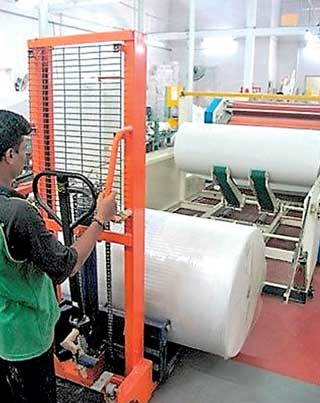Thursday Feb 26, 2026
Thursday Feb 26, 2026
Wednesday, 31 August 2022 00:00 - - {{hitsCtrl.values.hits}}
 |
 |
The hygiene soft tissue paper industry is a well-established industry in Sri Lanka since 1982, with over 40 years of manufacturing essential hygienic soft tissue products such as toilet rolls, paper serviettes, hand paper napkins,facial tissues, paper hand towels, industrial towels and rolls and various other related products.
While the hygienic soft tissue manufacturing industry is relatively small compared to other major industries, its products contribute significantly to the country’s overall personal hygiene and hospitality standards.
Their “import substitution” production units, based in several parts of the country, and competing with global brands, saves considerably in foreign exchange. Some of the local manufacturers also export these products to many neighbouring countries such as to the Maldives.
All tissue products are locally produced, by generating employment and income to well over 700 people and their families, directly and indirectly benefitting more than 5,000 families including all island distributors, their employees and families.
While it’s understandable to a certain extent, the possible reasons behind the recent temporary suspension on imports of nearly 305 non-essential finished products as per Gazette 2294/30 dated 23 August, there is no valid reason to suspend the imports of crucial essential raw materials for manufacturing into finished products at the factories in Sri Lanka, with a value addition process.
The recent restriction is a major setback to the current factory owners and their employees, and has caused a ripple effect, shocking many households that use such essential and hygiene soft tissue products for their everyday use. There is also a similar view among businesses in the hospitality and tourism, apparel and food industries, including hospitals and medical centres.
The Gazette indicates the restriction of the only two HS codes in the Sri Lanka Customs Tariff that relate to hygienic soft tissue papers; raw material tissue paper reels and finished product under subheadings of the main HS code 4803.00 (no subheadings) and 48.18.00 with subheadings.
The first HS code number 4803.00 is a main heading, strictly for the raw materials of large jumbo reels of tissue which is over 36 cm in reel width, used for the process of manufacture. These reels are not finished products, and finish products cannot be imported under this main heading. Thus, all imports under this main heading are a raw material used for the manufacture of finished products.
The second HS code 4818.00 has many subheadings, of which, only one subheading, which is 4818.90.20 is related to raw materials of tissue, which are jumbo reels above 15 cm to 36 cm reel width and are heavy reels of raw materials and not finished products. The rest of the sub heading under 4818.00 relate to the import of the finish goods.
These essential tissue products play a silent yet a preventive role to keep away germs, and viruses, especially during the past two years of COVID-19 and has been used effectively and regularly as at today. Health professionals and organisations including the World Health Organisation (WHO) recommend that the public should cover the mouth and nose with a facial tissue paper when coughing or sneezing.
The use of paper towels is encouraged too, for wiping hands after a hand wash using soap and water. The toilet roll is an essential necessity in all public places, such as hospitals, hotels, shopping malls, Government and private institutions, banks, and factories.
All local soft tissue manufacturers are concerned that this restriction will soon cause their ongoing factories to shut down, resulting in a complete shortage and non-availability of finish products to various institutions such as hotels, restaurants, cafes, hospitals, airlines, food and apparel factories, public institutions, along with the general public and households.
The tourism industry at large, which is just experiencing a rebound, the private healthcare institutions as well as numerous manufacturers have a mandatory obligation in providing such sanitation standards and procedures to its hundreds and thousands of workers, patients, clients, tourist guests. They will feel the shortage of these hygiene tissue products soon and abruptly.
The current level of raw materials is sufficient to last up to mid-September, resulting in a lack of basic sanitary expectations one can find in their own homes, workplaces and public spaces.
This undoubtedly calls for the high-level authorities and important decision makers for a de-list or the reversal on the “TS” as per the stated HS codes, to only resume the import of tissue paper raw materials in jumbo reels, so the local Sri Lankan owned factories can produce these important hygienic and essential tissue products to satisfy the basic hygiene needs of all Sri Lankans and the visiting tourist and guests to the country.